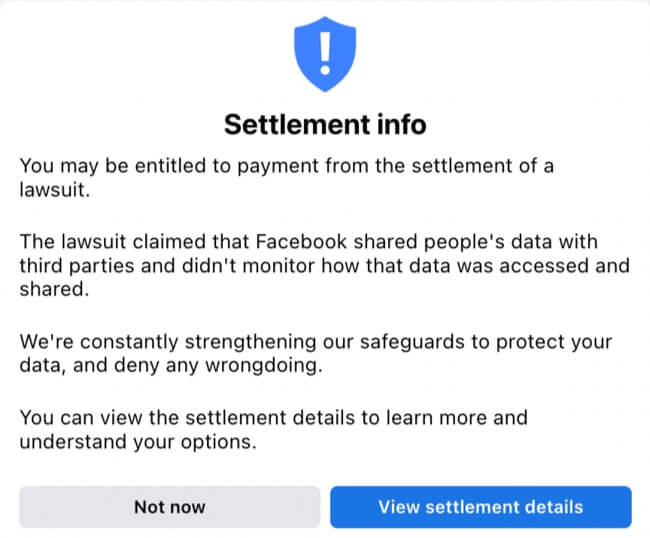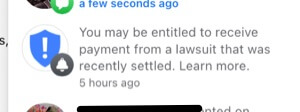
The news and notifications about the 2023 Facebook settlement are legitimate; it’s not a scam. If you used Facebook at any time between May 24, 2007, and December 22, 2022, you are what is called a ‘member of the class’ and entitled to part of the settlement money (that’s how class action lawsuits work). That said, you can be sure that plenty of scams will piggyback on to this Facebook settlement, so only go to the link that you get from Facebook, or that we are giving you here as it’s the same link.
If you’ve been on Facebook recently you may have received a message looking something like this in your Facebook notifications:
If you clicked on it you would have seen this:
Facebook Notification of 2023 Facebook Settlement
You may be entitled to payment from the settlement of a lawsuit. The lawsuit claimed that Facebook shared people’s data with third parties and didn’t monitor how that data was accessed and shared. We’re constantly strengthening our safeguards to protect your data, and deny any wrongdoing. You can view the settlement details to learn more and understand your options.
The Internet Patrol is completely free, and reader-supported. Your tips via CashApp, Venmo, or Paypal are appreciated! Receipts will come from ISIPP.
Facebook is a data aggregation and marketing company disguised as a social networking
platform.
In case you aren’t familiar with what exactly is a class action lawsuit, generally they start out as a regular lawsuit. In this case the lawsuit was originally filed by Velma Rankins (individually, and also on behalf of “all others similarly situated Plaintiffs”) as Velma Serina Rankins, individually and on behalf of all others similarly situated, v. Facebook, Inc.. There was also another plaintiff, Susan Hwang. Then there were a whole bunch of “interested parties” attached to the case, including Sandra Adkins, Steven Akins, Jason Ariciu, Anthony Bell, Tyoka Brumfield, Bridgett Burk, Wendy Burnett, Brendan Michael Carr, John Doe, Terry Fischer, Shelly Forman, Paige Grays, Mary Beth Grisi, Suzie Haslinger, Tabielle Holsinger, Taunna Jarvimaki, Olivia Johnston, Tyler King, Ashley Kmieciak, William Lloyd, Gretchen Maxwell, Scott McDonnell, Ian Miller, Harold Nyanjom, Jordan O’Hara, Lawrence Olin, Bridget Peters, Kimberly Robertson, Scott Schinder, Cheryl Senko, Dustin Short, Tonya Smith, Sheron Smith-Jackson, Mitchell Staggs, James Tronka, Charnae Tutt, Barbara Vance-Guerbe, Janice Vega-Latker, Juliana Watson, and Anthony Williams.
By demonstrating to the court that there were a whole bunch of similarly situated people out there who had also been (allegedly) hurt by Facebook’s actions, they convinced the court to turn the case into a class action. A class action is when the court determines that many, many more people than just the original plaintiffs have potentially been injured by the defendant’s actions, and that in fact there is an entire group of people – some already known, but many who are not already known – who may have been or in fact were hurt by the actions of the defendant. That group of people, both known and unknown, is called a “class”, and everyone who matches the criteria is a member of the class. Once a lawsuit is certified as a class action (rather than an action by an individual), then one single court can hear and decide the lawsuit for all members of the class, all at once. Members of the class may not even know that they are part of the class until the lawsuit has been resolved and they get a notice that they are a member of the class and entitled to part of the settlement (if the case settles) or award (if the case goes to trial and the plaintiffs win).
Once Rankins v. Facebook was certified as a class action lawsuit, it became known as In re: Facebook, Inc. Consumer Privacy User Profile Litigation. “In re:” is fancy legal speak for “regarding”.
So What Exactly is Claimed that Facebook Did Wrong?
According to the complaint, which you can see here, “Facebook shares its users’ personal data with third-party mobile device makers (“third- party device makers” or “device makers”), including Apple, Amazon, and Samsung, without the users’ consent and despite its promises that it does not share its users’ personal information without either providing notice or obtaining users’ permission. Specifically, backdoor data-sharing partnerships between Facebook and device makers have enabled device makers to obtain substantial information, including users’ relationship status, religion, and information about users’ friends—even where those users have denied Facebook permission to share data with any third parties.” The complaint also says that “Facebook is a data aggregation and marketing company disguised as a social networking platform.”
In addition, as explained on the Facebook settlement site (link below), “Numerous lawsuits were brought on behalf of Facebook users who allege that Facebook (now Meta Platforms, Inc.) shared or otherwise made accessible to third parties (including but not limited to third-party app developers, “whitelisted” parties, business partners, advertisers, and data brokers) user data and data about users’ friends without permission of the users whose data was shared, and did not sufficiently monitor and enforce third-party access or use of that data.”
What to Do
Whether or not you received a notice, if you used Facebook at any time between May 24, 2007, and December 22, 2022, go to the link below and register. You’ll also see information about if you want to “opt out” of the class; you would do that if you intend to sue Facebook on your own, rather than participate in the settlement.
Here’s the link.
Link to Register for the 2023 Facebook Settlement
To register yourself as a member of the class in the 2023 Facebook settlement, in order to get your payout, go here:
facebookuserprivacysettlement.com/
The Internet Patrol is completely free, and reader-supported. Your tips via CashApp, Venmo, or Paypal are appreciated! Receipts will come from ISIPP.










